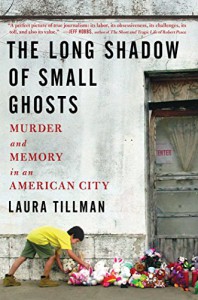Long Shadow of Small Ghosts

In Laura Tillman's debut book, she covers the 2003 murder of three young children in South Texas. Murdered by their parents, the short lives of Julissa, John Stephan, and Mary Jane, have left long shadows over the community of Brownsville, TX.
In an heartwrenching look at the ramifications of murder on a small community, Ms. Tillman exposes more about humanity than expected. She communicated with John Allan Rubio for a number of years after his conviction of murder in the case of his stepdaughter, son, and daughter, and this book is a result of her continued reporting. Ms. Tillman spent countless hours walking the streets of Brownsville, talking to Mr. Rubio's neighbors, family, friends, and community leaders in her efforts to tease out why this tragedy unfolded.
Rubio grew up poor and hispanic in a Texas border town, those were the first two strikes against him. His potential learning disabilities and mental illness were additional strikes, and his "falling through the cracks" seemed to seal his life and destiny up. This book explores how circumstances beyond ones control can really can control ones life. The injustice of being poor, uneducated, fragile, Mexican...Of being different. All these things are polarizing in the American judicial system.
I can't really begin to pick apart this book. I vaguely remembered hearing about this murder case, and immediately deciding that Rubio must be a monster. How could a father brutally murder his three children? How could he possibly be allowed to life after ending the lives of such young children? The babies were 3 years, 14 months, and 2 months. They were found in squalor, drug using parents, brutalized. These were the words in the headlines in March 2003. Rubio never denied killing the children, why shouldn't he be put to death?
Why indeed? What brings a person to that point, where they seem to crack, and commit an atrocity? Maybe the answers really aren't cut and dried, maybe they are firmly rooted in that person's past. Maybe the seeds of destiny, fate, predestination, are planted into us by our very surroundings? These are some of the questions posed to the reader by Ms Tillman. And questions to which there are no answers, easy or not. In fact, just trying to answer these questions for yourself tugs at our beliefs of what makes up a person.
I cried reading this book, on a few different occasions. I'm still asking myself questions about what might have happened under different circumstances. If Rubio had made it into the Army, if he'd not come from a poor family, if he'd been able to access care for his probable mental illness...Would the children have ever been in this kind of situation? Would the children be here today? Where would Rubio be in his life? But these are only questions. Ones that there can never be an answer to, because of circumstances falling together into a pattern that affects millions of people every single year. Poverty, skin color, lack of access to education to health care, drug use...Things that so many of us take for granted.
I'm recommending reading this to pretty much everyone. It should be required reading for sociology courses, for psychology classes, for people going into law, into political science...For people who care about other people, people who have begun to realize how polarized our thinking is, how "other" people aren't deserving of anything. I deeply wish that this book wasn't needed, that we as humans were advanced enough to believe that people are *all* deserving of an equal shot at life. But we're not, we won't ever get to that place.
This book hurts. It hits from so many different places in so many different ways. But all of them are needed.
In the interest of disclosure, I was provided with an ARC of this book from the publisher.










